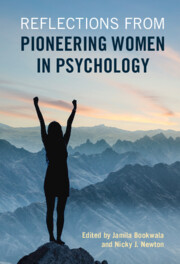Book contents
- Reflections from Pioneering Women in Psychology
- Reflections from Pioneering Women in Psychology
- Copyright page
- Contents
- Contributors
- Foreword
- Acknowledgments
- Introduction
- Chapter 1 Hardly a Straight Line
- Chapter 2 Challenging Paradigms
- Chapter 3 From Young and Naïve to Old and Experienced
- Chapter 4 Being the Change You Want to See in the World
- Chapter 5 Accidental Professor
- Chapter 6 Finding a Place and Changing the Space
- Chapter 7 The More You Do, the Better It Gets
- Chapter 8 Happily Ever After
- Chapter 9 Love and Work
- Chapter 10 Overcoming Obstacles and Thriving
- Chapter 11 Out of the Box
- Chapter 12 Stress Has Been Good to Me
- Chapter 13 On Pioneering at Northwestern University… With a “Village” of Supports
- Chapter 14 Against All Odds
- Chapter 15 Tricked by Memory
- Chapter 16 Doing Psychology in Unsettled Times
- Chapter 17 Overcoming Obstacles
- Chapter 18 Knocking on Doors that Opened for Me
- Chapter 19 Paths Unexpected, but Rewarding, during an Academic Journey
- Chapter 20 Reflections on an Improbable Journey
- Chapter 21 The Delicate Art of Balancing Serendipity and Planfulness in an Academic Career
- Chapter 22 A “Skin in the Game” Scaffolded Career Path
- Chapter 23 A Wonderful Journey Along an Unforeseen Path
- Chapter 24 Choosing Both
- Chapter 25 Identity and My Life Story in Psychology
- Chapter 26 Doing What Matters: A Framework for Academic Success
- Conclusion
- Index
- References
Chapter 24 - Choosing Both
Finding a Path as an Academic Feminist
Published online by Cambridge University Press: 09 April 2022
- Reflections from Pioneering Women in Psychology
- Reflections from Pioneering Women in Psychology
- Copyright page
- Contents
- Contributors
- Foreword
- Acknowledgments
- Introduction
- Chapter 1 Hardly a Straight Line
- Chapter 2 Challenging Paradigms
- Chapter 3 From Young and Naïve to Old and Experienced
- Chapter 4 Being the Change You Want to See in the World
- Chapter 5 Accidental Professor
- Chapter 6 Finding a Place and Changing the Space
- Chapter 7 The More You Do, the Better It Gets
- Chapter 8 Happily Ever After
- Chapter 9 Love and Work
- Chapter 10 Overcoming Obstacles and Thriving
- Chapter 11 Out of the Box
- Chapter 12 Stress Has Been Good to Me
- Chapter 13 On Pioneering at Northwestern University… With a “Village” of Supports
- Chapter 14 Against All Odds
- Chapter 15 Tricked by Memory
- Chapter 16 Doing Psychology in Unsettled Times
- Chapter 17 Overcoming Obstacles
- Chapter 18 Knocking on Doors that Opened for Me
- Chapter 19 Paths Unexpected, but Rewarding, during an Academic Journey
- Chapter 20 Reflections on an Improbable Journey
- Chapter 21 The Delicate Art of Balancing Serendipity and Planfulness in an Academic Career
- Chapter 22 A “Skin in the Game” Scaffolded Career Path
- Chapter 23 A Wonderful Journey Along an Unforeseen Path
- Chapter 24 Choosing Both
- Chapter 25 Identity and My Life Story in Psychology
- Chapter 26 Doing What Matters: A Framework for Academic Success
- Conclusion
- Index
- References
Summary
In this chapter, I illustrate a central theme in my life as an academic feminist by describing the challenges I felt were posed by five particular dilemmas. The theme is the effort to avoid foreclosing choices or alternatives, in the interest of maintaining the breadth of my interests and commitments. The dilemmas include: the decision to study psychology vs. other fields; adopting the “micro” perspective of psychology vs. a more “macro” focus; studying women, but not sex differences; recognizing multiple hierarchies that structure social relations vs. focusing on gender; being a scholar vs. an advocate for social change. I outline how my career involved repeated efforts to avoid making choices that would narrow the range of my thinking, my scholarship, and working to improve “the world,” or at least the university.
- Type
- Chapter
- Information
- Reflections from Pioneering Women in Psychology , pp. 306 - 317Publisher: Cambridge University PressPrint publication year: 2022

